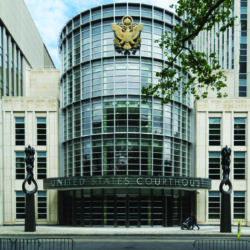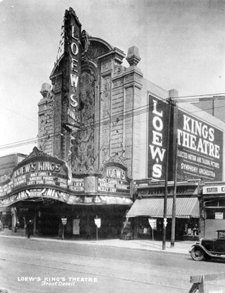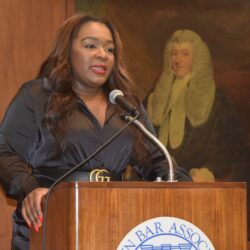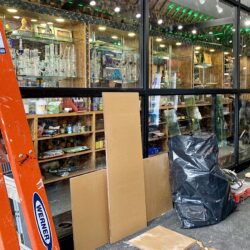
On this day in history, May 7: Brooklyn once very Loew

loews%20kings.jpg
At one time in the not far-distant past there was hardly a soul in New York City who was not familiar with the name Loew. The man himself preferred the pronunciation of “Low,” although the custom of generations of New Yorkers was to pronounce it “Lowey.” And the name was hardly ever uttered without being followed by the name of an elaborate movie palace. In Brooklyn it might have been the Metropolitan, Pitkin, Kings, Valencia, Coney Island, Melba, Gates, Oriental or any one of dozens more. In Manhattan, it would be, among many others, the State, Sheridan Square, Delancey and Astoria.
But who was this Loew whose name preceded the name of so many fabulous movie palaces?
Marcus Loew was born in Manhattan on May 7, 1870 in the slums at Fourth Street and Avenue B, the son of Jewish immigrants from Austria. He dropped out of school at 9 to hawk lemons and newspapers. He later set up a printing business and started a weekly advertiser and finally, like many another Lower East Side lad, gravitated into the fur business.
Loew noticed some of the little peep-box theaters along 14th Street and became fascinated with them, particularly at seeing how willingly people parted with their nickels, to be thrilled with 60-second strips of film that depicted horses galloping, ballerinas twirling, or musclemen flexing. So, in 1905, Loew moved into the penny arcade business. He and a partner, Adolph Zukor, purchased them in Manhattan and Cincinnati and by 1907 Loew owned some 40 nickelodeons all over the country.
On a business trip to Cincinnati, Loew ran across a theater that projected films onto a screen rather than requiring patrons to peer into individual boxes. As with the peep-shows he was again entranced and rushed back to New York, bought a burlesque house in Brooklyn and renamed it The Royal and got into the big-screen theater business.
By 1912 his Loew’s Theatrical Enterprises owned some 400 movie theaters. Wanting to provide his theaters with a constant supply of films, he bought Metro Pictures. In 1924 he acquired controlling interest in the Goldwyn company and Louis B. Mayer Pictures and consolidated his three production companies into Metro-Goldwyn-Mayer (MGM) with Loew’s Inc., as the parent company. He controlled production, distribution and exhibition of his own pictures. He lived out the last few years of his life as one of the film industry’s great titans.
Marcus Loew died in 1927 at age 57 just before the advent of talking pictures. In recent years, Sony Corporation bought out the Loew’s chain, and then in 2006 Loew’s merged with AMC Theatres. What few Loew’s palaces remain today have been multiplexed or sold to become churches, such as downtown Brooklyn’s Metropolitan and Manhattan’s 175th Street. Some now sit empty and decaying like the Kings in Brooklyn. But it was announced in February 2010 that a developer is going to refurbish the Loew’s Kings as a live entertainment venue. The project is expected to cost $70 million.
— Vernon Parker
Leave a Comment
Leave a Comment


